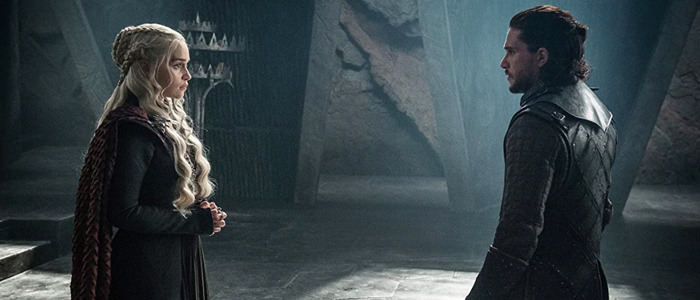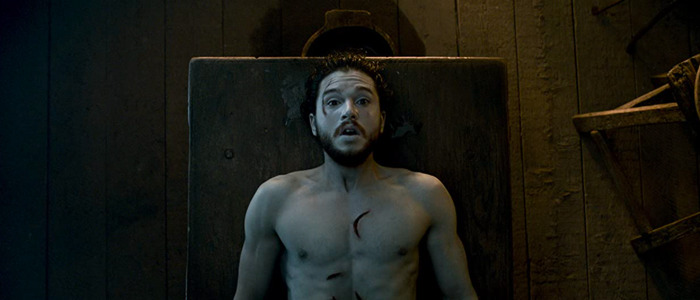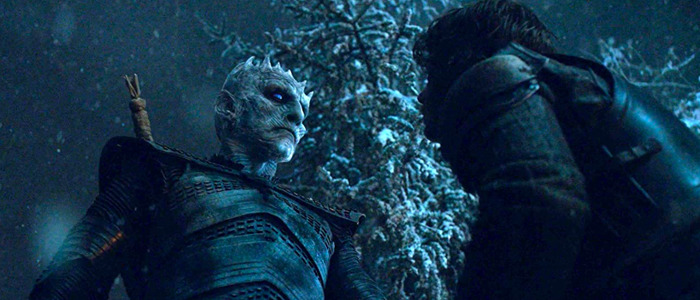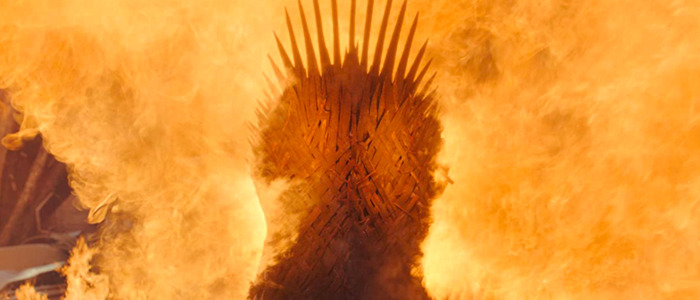Wrestling With The Complex Legacy Of 'Game Of Thrones' On Its 10th Anniversary
Attempting to define legacy – whether of an individual, an institution, or a piece of art – can be a fraught proposition. By our very nature, human beings generally tend to crave oversimplified narratives to help make sense of a messy and chaotic world. After all, depending on who you ask, George Lucas will either go down as the godfather of all our nerdy obsessions or the monster who trampled on our collective childhoods, superhero blockbusters ought to be considered as either the modern heir-apparent to Greek myth or an unmitigated blight upon the sanctity of art itself, and Game of Thrones was either the greatest water cooler show of the modern era or a cautionary tale of how unwary creators can dismantle their own sterling reputation in just a final few episodes.The truth, of course, resides somewhere in the middle of these extremes.When Game of Thrones (in)famously ended its watch on May 19, 2019, its body of work was hardly cold before many of us – fans, critics, and rubbernecking onlookers alike – rushed to fill social media with grand proclamations and hot takes about What It All Meant. Not even two years after the divisive finale aired, it remains far too soon to carve the series' ultimate fate in stone. A full decade removed from the very first episode, however, affords us a vital opportunity – not to relitigate a divisive concluding stretch of uneven storytelling, but to reevaluate our wide-ranging reactions in the hopes of discerning how they reflect on both ourselves and the actual show.Throughout Thrones' run and particularly in the aftermath of its finale, a certain handful of oft-repeated explanations and theories seemed to dominate the cultural ether, all in a futile effort to summarize eight seasons' worth of peaks and valleys into little more than viral-ready soundbites. Those talking points instantly became accepted as fact. Taken at face value, none of these arguments quite managed to account for the show's label-defying complexities with any real sense of satisfaction (or even accuracy), despite feeling right to so many. But what if we view them as an indicator of how the show's true legacy simply refuses to be distilled into a handful of easy answers?In that case, perhaps examining the three most pervasive popular beliefs and finding the root of the issue underneath each one can reveal more about our relationship with Game of Thrones and its long-term significance in our zeitgeist than anything else ever could. We'll tackle these one-by-one:
"Nobody talks about Game of Thrones anymore."
Let's call this "The Avatar Effect." (No, not that effect.)In the years since James Cameron's newly re-crowned box office champ first took the world by storm, it's become somewhat the joke du jour to mock the glaring discrepancy between its one-time inescapable popularity versus its utter failure to nurture a lasting imprint whatsoever in our collective consciousness over a decade later. A devoted fanbase champing at the bit for any of its four planned sequels either faded away over time or simply never existed, the idea goes, and nowadays Avatar only really seems to come up in everyday conversation when, uh, discussing how it doesn't really come up in everyday conversation.Rather shockingly, the overwhelming backlash to certain aspects of the last season meant that Game of Thrones eventually found itself as the latest poster child for this bizarre phenomenon – even in spite of its penchant for fueling nonstop headlines with almost every new episode in recent seasons. Is there any legitimacy to the narrative of this fall from the undisputed king of serialized television to a mere shell of itself, bowing out with a whimper? Well...it's complicated.The first and most obvious counterpoint to this rhetoric, ironically, is that constantly bringing up the extent to which a pop culture artifact has supposedly been "forgotten" can't help but undercut the entire argument. Sort of like how loudly and repeatedly insisting on having gotten over an ex in the immediate aftermath of a breakup strongly suggests the exact opposite, there's only so much mileage a disgruntled fan can wring out of the idea that Game of Thrones left no tangible impact in its wake before it starts to ring hollow. Did that previous fixture in your life really not mean anything after all? Or is that just a denial-ridden coping mechanism to help deal with an unexpected, unwanted ending?Recent empirical evidence appears to contradict such claims as well. Between Netflix's The Witcher, Starz's Outlander, and Amazon's highly anticipated Lord of the Rings series, this fantasy arms race of sorts may have spurred the call to go all-in on Game of Thrones prequels and spin-offs under creator George R.R. Martin's watchful eye. As HBO expands the world of Westeros, like Cameron has done with Avatar, it would seem harder and harder to casually dismiss such an undeniably popular property as a fad or relic of a bygone era. The question then becomes, at what point does continuing to downplay Thrones' relevance feel less like a compelling argument and more like sour grapes over lingering personal dissatisfaction?To be fair, this widespread animus is well worth digging into – it's not like there aren't perfectly valid critiques of the show overall and especially the final season(s) – but it's important to remember that two things can be true at the same time: the thudding conclusion to Game of Thrones sucked a lot of enthusiasm out of the immediate discourse in the post-finale landscape, and it's a fool's errand to try and definitively explain away a show's legacy without allowing space for some sorely needed perspective. At a certain point, smarter and more invested writers than I will have to reckon with Avatar and the possibility that boasting such universal appeal may have directly led to its inability to stick around in our collective memory in the long run...but Game of Thrones isn't Avatar, no matter how much simpler and easier that would've been for our order-seeking brains.When it's all said and done, "The Iron Throne" and the five controversial episodes leading up to it will undoubtedly go a long way towards defining what the masses will remember first when thinking of the show in its totality. But that's not the end of the story, and I suspect the upcoming years chock-full of future Game of Thrones stories and retrospectives about the original will have the final say. Maybe one day the "Nobody talks about it anymore" theory will be relegated to, amusingly enough, its own forgotten dustbin of pop culture hot-take memory.
"Game of Thrones lost its way once it outpaced George R.R. Martin's books."
Adaptations can be a double-edged sword. Hew too close to beloved source material, and creators can expect to be criticized for a lack of imagination and for neglecting to make changes necessitated by working in a different medium altogether. Stray too far, and ardent fans will suddenly be in an uproar over unforgivable treatment of the text and subsequently question the point in adapting their favorite story to begin with.During much of Game of Thrones, showrunners David Benioff, D.B. Weiss, and their team of writers carefully navigated this tightrope with aplomb – especially considering that the book series was not complete at the time (and still isn't). As is usually the case, the earlier seasons tended to be more faithful to Martin's A Song of Ice and Fire books, even with several notable omissions, additions, and deviations. As the show progressed and relatively minor changes rippled outward into gradually larger ones, observant viewers recognized the two streams were diverging significantly even while sharing the same baseline DNA. As Martin himself has noted on many occasions, both could exist and be enjoyed simultaneously without needing to pit one against the other.Naturally, this reasonable and nuanced outlook was promptly thrown out the window during the post-finale panic in favor of finding a quick, all-encompassing talking point: one with the heavy implication that most of Game of Thrones' early success was a product of little more than following Martin's guideline, as if it were as easy as plugging in the same plot points from the books and then standing aside.For disillusioned book readers, this manifested itself through the presumption that everything went south after Season 5 caught up with the events of Martin's last published novel, punctuated by the "death" of Jon Snow (Kit Harington). Although some could argue that this loosely fits the timeframe for when Thrones underwent something of an identity shift, the idea that it's as simple a problem as running out of source material is yet another broad, catch-all diagnosis that practically wilts under scrutiny. (For my money, the Season 4 twin killings of Pedro Pascal's Oberyn Martell and Charles Dance's Tywin Lannister, though narratively justified and impeccably realized, represented a turning point from which the show and the books never completely recovered.)You only need to look back at some of the best-written scenes throughout the series to confirm this. Martin's strict point-of-view structure constrained his books in a way Benioff and Weiss' scripts never did, and more often than not the results of this freedom were – dare I say it – a marked improvement.As early as Season 1, wholly invented scenes added texture and dimensionality to supporting roles in ways Martin only hinted at. A dialogue-only showcase involving King Robert Baratheon (Mark Addy), Barristan Selmy (Ian McElhinney), and Jaime Lannister (Nikolaj Coster-Waldau) begins with the three soldiers swapping world-building war stories before culminating in Jaime's haunted and spiteful recollection of the Mad King's final words, "Burn them all." Another original scene, a beautifully understated private moment humanizing both Robert and his estranged wife Cersei Lannister (Lena Headey), fills in all sorts of gaps in their troubled political marriage and the toll it took in keeping the Seven Kingdoms from falling apart. And the memorable first appearance of Tywin Lannister cleverly pauses the otherwise breathless pace of the season's seventh episode, giving us insight into Jaime's complicated dynamic with his father while establishing Tywin's ruthless devotion to protect their family dynasty at all costs. This doesn't even touch on later sequences such as the stand-out "Chaos is a ladder" monologue/montage or the inspired choice to have Arya Stark (Maisie Williams) serve as Tywin's cupbearer while a captive in Harrenhal rather than Roose Bolton's (Michael McElhatton), as she does in the book. (That subplot also features a wonderful original tête-à-tête between Arya and Tywin that's primarily focused on, fittingly, the question of legacy.) Tellingly, all of these examples rely only on the broadest strokes of Martin's writings to take these scenes to the next level – meaning that Benioff and Weiss were working with roughly the same insider information that they had when bringing the series in for a landing. The biggest variable, as it turns out, was the execution.Of course, critics can fire back with their own litany of show-specific misfires as proof of Thrones veering off the tracks without Martin's steady hand at the wheel. Some massively divergent storylines continue to be questioned to this day. Others are better off collecting figurative dust, like the tragically mishandled Iron Island and Dorne subplots, the latter of which the writers smartly aborted with a series of unceremonious deaths. Worst of all had to be the wildly controversial decision to subject fan-favorite character Sansa Stark (Sophie Turner) to the relentless villainy of Ramsay Bolton (Iwan Rheon), especially after she'd endured so much suffering to that point already.Practically speaking, however, comparisons to the source material is only one small tool out of many at our disposal when it comes to gauging any adapted work. To dilute Game of Thrones to its barest essence as an adaptation not only does a disservice to dozens of hours of quality entertainment, but it flattens and misrepresents the sheer scope and scale of storytelling that the show had to offer, flaws and all. While it's understandably tempting to do otherwise, it's safe to say that these works must be judged by their own merits.The ultimate legacies of Game of Thrones and A Song of Ice and Fire will be decided not through their varying adherence to "canon," but by how they approached the similar-yet-distinct stories they chose to tell.
"Game of Thrones ended up becoming precisely the kind of show it was meant to subvert."
Of all the attempts to find a one-size-fits-all panacea for Game of Thrones' unwieldy arc over the years, this last one perhaps contains the most elements of truth to it.It's not an unfair assessment to say that the show that once beheaded the honorable Ned Stark (Sean Bean) for his inability to play the game or allowed his justice-seeking son Robb (Richard Madden) to remain undefeated in the field of battle only to brutally cut him down at a wedding would scarcely even recognize the one which later guided the cartoonish villain Ramsay Bolton and his enemy forces into a downright Lord of the Rings-esque defeat and gave Arya the triumphant victory over the Night King right when all hope seemed lost. Remember when Thrones used to dig deep into the minutiae of political intrigue and maneuvering and make time for conversations on the nature of power in between its extravagant, expectation-defying set pieces? It's a far cry from the far more mainstream, widely-appealing version in later years that prioritized action and spectacle above all else.But while many of us can at least agree on the existence of this stark (ha!) divide, even if individual preferences can lean either way, it still can't quite do justice to the reality of Game of Thrones.For one thing, this overlooks the inexorable fact that media built on a foundation of subversion and self-critique of its genre will, more likely than not, circle right back around to more traditional storytelling over time. With Thrones, this was made clear right from the very first scene of the first episode: an unstoppable horde of ice creatures bearing down on an ignorant world too caught up in petty conflicts and backstabbing to fight the real threat. Did anyone seriously believe this wouldn't eventually result in a fairly archetypical, unambiguously good-vs-evil fantasy showdown?This isn't exclusive to Game of Thrones, either. Damon Lindelof's Watchmen, a worthy continuation of the seminal comic, even if author Alan Moore would never approve of it (remember that earlier point about how multiple things can be true at the same time?), impressively engaged with the original's themes regarding the harmful and corrosive influence of superheroes, but still concluded by embracing its superheroic trappings rather than outright rejecting them. On a similar note, Eric Kripke's adaptation of The Boys came along at the perfect moment, taking advantage of our current superhero movie boom in order to satirize and parody the genre within an inch of its life. Yet for all its bluster, this deconstructivist story couldn't resist playing it earnestly straight at crucial moments, pulling off last-minute changes of heart and giving evildoers their deserved comeuppance.Thrones stubbornly managed to sneak in a glimpse of its formerly reputation-defining shock tactics before the curtains were finally drawn. The aforementioned battle at Winterfell during "The Long Night" weaponized the expectations instilled in ourselves from prior seasons. Expecting an absolute bloodbath, with major protagonists slaughtered left and right? Well, they were all spared a gruesome fate at the hands of the Army of the Dead; the only substantive death toll involved bit players who'd long since outlived their usefulness. While the battle itself may have ended predictably, the very placement of the episode within the overall season was anything but. By conclusively ending the White Walker threat with three full episodes remaining, it ensured the true final conflict would revolve around what Game of Thrones has always been about: human conflict, greed, politics, and despotic power-lust. And no, we can't go any further without finally acknowledging Daenerys Targaryen (Emilia Clarke) and her expectation-shattering, internet-breaking heel turn in "The Bells.” But no matter where you land on the debate over whether her descent into supervillainy was properly set-up or not, it's almost weirdly refreshing to see that Benioff and Weiss still retained a spark of their prior willingness to twist the knife and make characters we've grown to like do morally disturbing things.All of this adds up to an equally uncomfortable realization: movies and television can be just as complex, multifaceted, and contradictory as any human being. Thrones may have started out one way and ended up in a vastly different place, but isn't that true of all longform storytelling? In the end, Tyrion Lannister himself (Peter Dinklage) may have summed it up best. If you're looking for easy answers that can put Game of Thrones, of all things, in a neat and tidy box, "you've come to the wrong place."
Conclusion
In the end, one aspect links each of these three unsatisfactory attempts to define the show's legacy: they're all missing the forest for the trees. Contrary to popular belief, there is no magic bullet or elixir that can single-handedly account for an entire decade of highs and lows. The reason we can revisit the first episode of Season 1, "Winter Is Coming," and contextualize it within the series' overall framework is because we now have ten years' worth of perspective. None of us are the same now as we were when we first watched how it all began. With any luck, we'll have grown even more by the time we can truly begin to grapple with the legacy of Game of Thrones.




